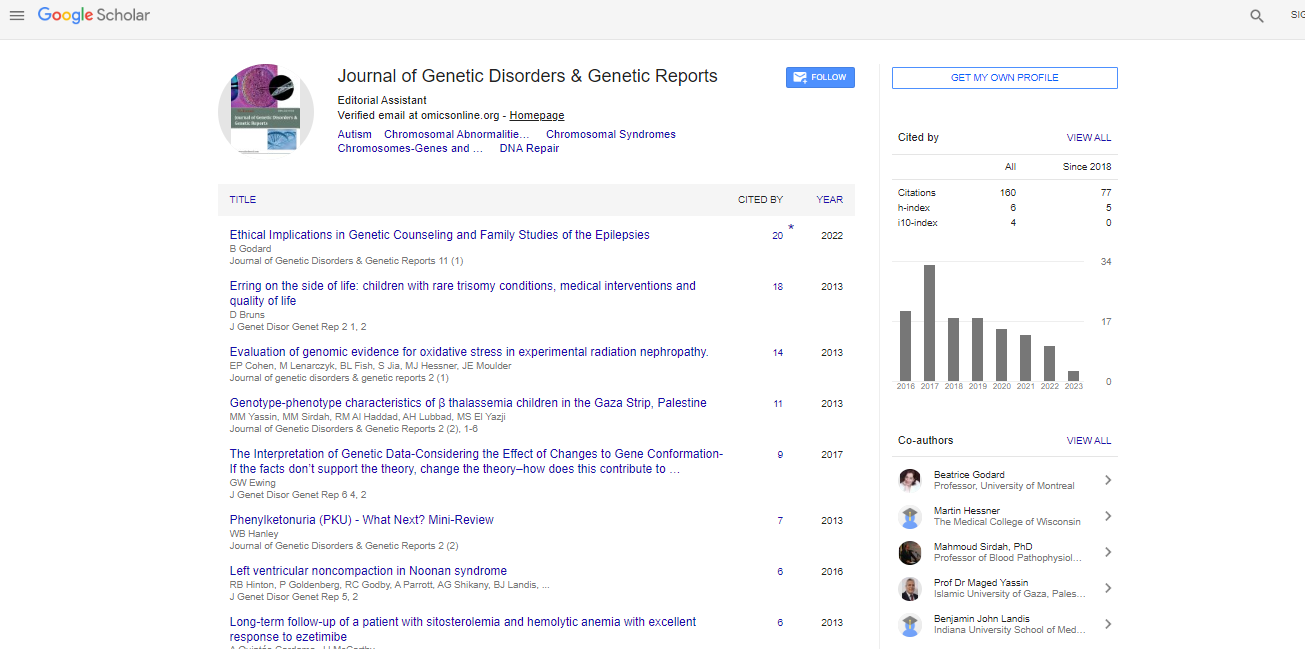Commentary, J Genet Disor Genet Rep Vol: 12 Issue: 3
Cytogenetics: Exploring the Chromosomal Frontier of genome
Laura Hella*
1Department of Genetic and Genomic Medicine, University of California, Irvine, USA
*Corresponding Author: Laura Hella,
Department of Genetic and Genomic
Medicine, University of California, Irvine, USA
E-mail: hellalaura@gmail.com
Received date: 15 May, 2023, Manuscript No JGDGR-23-106020;
Editor assigned date: 17 May, 2023, PreQC No JGDGR-23-106020 (PQ);
Reviewed date: 01 June, 2023, QC No JGDGR-23-106020;
Revised date: 08 June, 2023, Manuscript No JGDGR-23-106020 (R);
Published date: 16 June, 2023, DOI: 10.4172/2576-1439.1000206
Citation: Hella L (2023) Cytogenetics: Exploring the Chromosomal Frontier of genome. J Genet Disor Genet Rep 12:3.
Abstract
Description
Cytogenetics is a fascinating field that investigates the structure, function, and behavior of chromosomes within cells. By examining the chromosomes organization, number, size, and genetic content, cytogeneticists unravel the mysteries of the chromosomal and its implications for human health, development, and disease.
The basics of chromosomes
Chromosomes are the thread-like structures found within the nucleus of cells. They are composed of Deoxyribonucleic Acid (DNA), proteins, and other molecules that carry the genetic information necessary for the development and functioning of organisms. Humans typically possess 46 chromosomes, organized into 23 pairs. Cytogenetic analysis allows scientists to visualize and study the structure, number, and arrangement of chromosomes, providing insights into normal chromosomal patterns and identifying abnormalities associated with genetic disorders.
Techniques in cytogenetics
Cytogenetics employs a range of techniques to study chromosomes. The most common method is karyotyping, which involves staining chromosomes to create a visual representation of their arrangement and structure. Fluorescence In Situ Hybridization (FISH) is another powerful technique that utilizes fluorescent probes to detect specific DNA sequences on chromosomes. FISH enables researchers to identify chromosomal abnormalities and map genes to specific chromosomal locations. Comparative Genomic Hybridization (CGH) and Spectral Karyotyping (SKY) are advanced techniques that provide higher resolution in detecting genetic alterations and rearrangements.
Applications in clinical diagnosis
Cytogenetic analysis plays a vital role in clinical diagnosis, particularly in identifying chromosomal abnormalities associated with genetic disorders. Cytogenetic testing helps diagnose conditions such as Down syndrome, Turner syndrome, and certain types of leukemia. The identification of chromosomal abnormalities provides major information for prognosis, treatment decisions, and genetic counseling. Cytogenetic analysis is also employed in Preimplantation Genetic Diagnosis (PGD), prenatal testing, and infertility investigations, enabling the detection of chromosomal abnormalities in embryos or fetuses.
Cytogenetics and cancer research
Cytogenetics plays a significant role in cancer research, as chromosomal abnormalities are frequently observed in cancer cells. The study of cancer cytogenetics involves identifying and characterizing specific chromosomal alterations associated with different types of cancers. These alterations, such as translocations, deletions, or amplifications, can provide insights into the underlying mechanisms of cancer development, progression, and treatment resistance. Cytogenetic analysis guides targeted therapies, predicts prognosis, and aids in monitoring disease progression.
Advancements and future perspectives
Advancements in cytogenetic techniques, including molecular cytogenetics and high-resolution genomic analysis, continue to expand our understanding of chromosomal biology and genetic disorders. Newer technologies, such as array-based Comparative Genomic Hybridization (aCGH) and Next-Generation Sequencing (NGS), offer higher resolution and increased efficiency in detecting chromosomal abnormalities. Additionally, the integration of cytogenetic data with other approaches, such as genomics and transcriptomics, provides a comprehensive understanding of the molecular basis of diseases.
Ethical considerations
As with any genetic information, the ethical considerations surrounding cytogenetics are significant. Genetic privacy, informed consent, and the responsible use of genetic data are essential in research and clinical practice. Genetic counseling and support are crucial in providing individuals and families with comprehensive information about the implications of cytogenetic findings, recurrence risks, and available management strategies.
Conclusion
Cytogenetics offers valuable insights into the chromosomal landscape of life, unraveling the mysteries of chromosome structure, function, and genetic disorders. From clinical diagnosis to cancer research, cytogenetic analysis provides essential information for prognosis, treatment decisions, and genetic counseling. As technology advances and our understanding deepen upon, cytogenetics will continue to play a crucial role in unraveling the complexities of genetic diseases and contributing to advancements in personalized medicine and genomic research. Responsible use of cytogenetic information and ethical considerations ensure its beneficial and equitable application.
 Spanish
Spanish  Chinese
Chinese  Russian
Russian  German
German  French
French  Japanese
Japanese  Portuguese
Portuguese  Hindi
Hindi 



